基本句型一般疑问句和特殊疑问句
小学英语四种基本句型-肯定句、否定句、一般疑问句与特殊疑问句
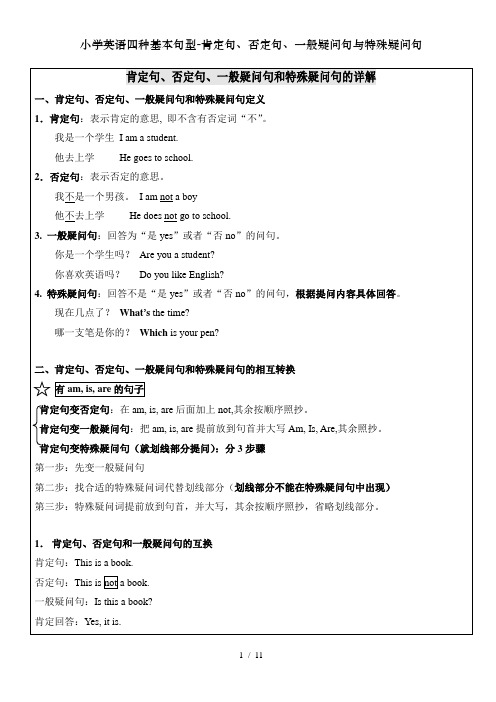
3 / 11
小学英语四种基本句型-肯定句、否定句、一般疑问句与特殊疑问句 特殊:
1.some 变为 any There are some birds in the tree.→There aren't any birds in the tree. 但是,若在表示请邀请、请求的句子中,some 可以不变。 Would you like some orange juice? 与此相关的一些不定代词如 something, somebody 等也要进行相应变化。
2.就划线部分提问(变特殊疑问句) I like English. 第一步:先变一般疑问句 Do you like English? 第二步:找合适的特殊疑问词代替划线部分 Do you like what? 第三步:特殊疑问词提前放到句首,并大写,其余按顺序照抄,省略划线部分。 What do you like?
类别 陈述句
疑问句
用法
标点
肯定 叙述一件事情或 说明说话人的看法 .
否定
一般 用于提出问题
?
特殊 用于提出问题
?
例句 This is a bag. That's my book. I can see a bag over there. I don't know. Are you a student? Do you like puppets? Can you speak English? What's your name? Where's my bag? How many trees are there?
1. 肯定句、否定句和一般疑问句的互换 肯定句:This is a book. 否定句:This is not a book. 一般疑问句:Is this a book? 肯定回答:Yes, it is.
一般疑问句、特殊疑问句的构成形式及基本用法
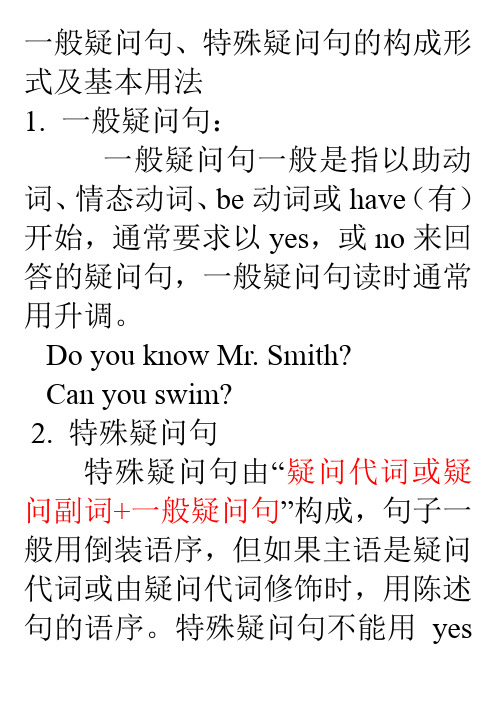
一般疑问句、特殊疑问句的构成形式及基本用法1. 一般疑问句:一般疑问句一般是指以助动词、情态动词、be动词或have(有)开始,通常要求以yes,或no来回答的疑问句,一般疑问句读时通常用升调。
Do you know Mr. Smith?Can you swim?2. 特殊疑问句特殊疑问句由“疑问代词或疑问副词+一般疑问句”构成,句子一般用倒装语序,但如果主语是疑问代词或由疑问代词修饰时,用陈述句的语序。
特殊疑问句不能用yes或no回答,读时用降调。
例如:Who is on duty today?How long have you been in Beijing? What time do you get up every morning?What must I do now?3. 注意疑问词的选择1. 问“谁”用who或whom。
如:Who is a doctor?Li Lei is a doctor.(对主语提问用who,对宾语提问用who,whom均可)2. 问“谁的”用whose。
如:Whose book is this?This is his book.3. 问“地点”用where。
如:Where is the ball?The ball is under the bed.4. 问“原因”用why。
如:Why didn't he come?He didn't come because he was ill.5. 问“身体状况”用how。
如:How are you?I'm fine.6. 问“方式”用how。
如:How did he do it?He did it in that way.7. 问“程度”用“how +被修饰语”。
如:How wide is the river?The river is five metres wide.8. 问“多少”用how much或how many。
小学英语四种基本句型-肯定句、否定句、一般疑问句与特殊疑问句
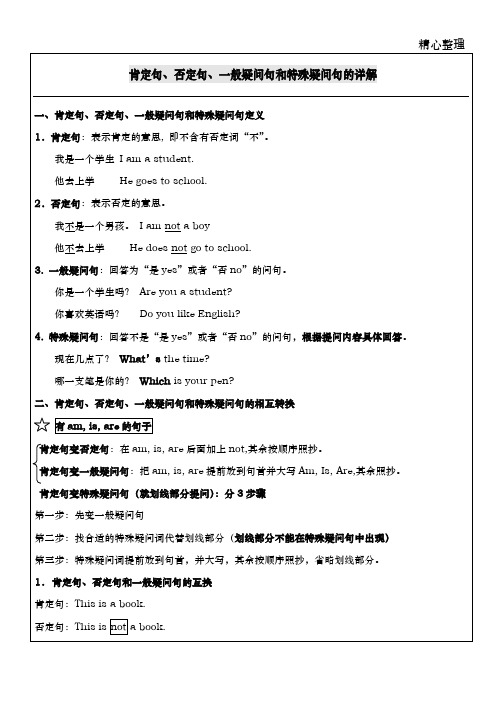
精心整理
一般疑问句:Is this a book? 肯定回答:Yes, it is. 否定回答:No, it isn’t. 2. 就划线部分提问(变特殊疑问句) This is a book. 第一步:变一般疑问句 Is this a book? 第二步:找合适的特殊疑问词 Is this what ? 第三步:特殊疑问词提前放到句首,并大写,其余按顺序照抄,省略划线部分。What is this?
肯定句、否定句、一般疑问句和特殊疑问句的详解
精心整理
一、肯定句、否定句、一般疑问句和特殊疑问句定义 1.肯定句:表示肯定的意思, 即不含有否定词“不”。
我是一个学生 I am a student. 他去上学 He goes to school. 2.否定句:表示否定的意思。 我不是一个男孩。 I am not a boy 他不去上学 He does not go to school. 3. 一般疑问句:回答为“是 yes”或者“否 no”的问句。 你是一个学生吗? Are you a student? 你喜欢英语吗? Do you like English? 4. 特殊疑问句:回答不是“是 yes”或者“否 no”的问句,根据提问内容具体回答。 现在几点了? What’s the time? 哪一支笔是你的? Which is your pen? 二、肯定句、否定句、一般疑问句和特殊疑问句的相互转换 有 am, is, are 的句子 肯定句变否定句:在 am, is, are 后面加上 not,其余按顺序照抄。 肯定句变一般疑问句:把 am, is, are 提前放到句首并大写 Am, Is, Are,其余照抄。 肯定句变特殊疑问句(就划线部分提问):分 3 步骤 第一步:先变一般疑问句 第二步:找合适的特殊疑问词代替划线部分(划线部分不能在特殊疑问句中出现) 第三步:特殊疑问词提前放到句首,并大写,其余按顺序照抄,省略划线部分。 1. 肯定句、否定句和一般疑问句的互换 肯定句:This is a book. 否定句:This is not a book.
小学英语四种基本句型肯定句否定句般疑问句与特殊疑问句精编版

1._______________ is this It’s a rubber. 2._____ _______ rubbers are there in the pencilbox? 3._____ _______ is your brother He’s nine. 4.________ are they They are cows. 5. _______ are you I’m fine. 6. _______ do you feel We are happy.
第二步:找合适的特殊疑问词 Is this what
第三步:特殊疑问词提前放到句首,并大写,其余按顺序照抄,省略划线部分。What is this?
没有 am, is, are 的句子 肯定句变否定句:在主语后面加上 do not 或者 does not,其余按顺序照抄动词用原形 肯定句变一般疑问句:在句首加 do 或者 does 并大写,其余照抄。注意:动词用原形 肯定句变特殊疑问句(就划线部分提问):分 3 步骤 第一步:先变一般疑问句 第二步:找合适的特殊疑问词代替划线部分(划线部分不能在特殊疑问句中出现) 第三步:特殊疑问词提前放到句首,并大写,其余按顺序照抄,省略划线部分。
现在几点了? What’s the time? 哪一支笔是你的? Which is your pen?
二、肯定句、否定句、一般疑问句和特殊疑问句的相互转换 有 am, is, are 的句子
肯定句变否定句:在 am, is, are 后面加上 not,其余按顺序照抄。 肯定句变一般疑问句:把 am, is, are 提前放到句首并大写 Am, Is, Are,其余照抄。 肯定句变特殊疑问句(就划线部分提问):分 3 步骤 第一步:先变一般疑问句 第二步:找合适的特殊疑问词代替划线部分(划线部分不能在特殊疑问句中出现) 第三步:特殊疑问词提前放到句首,并大写,其余按顺序照抄,省略划线部分。
一般疑问句、特殊疑问句的构成形式和基本用法
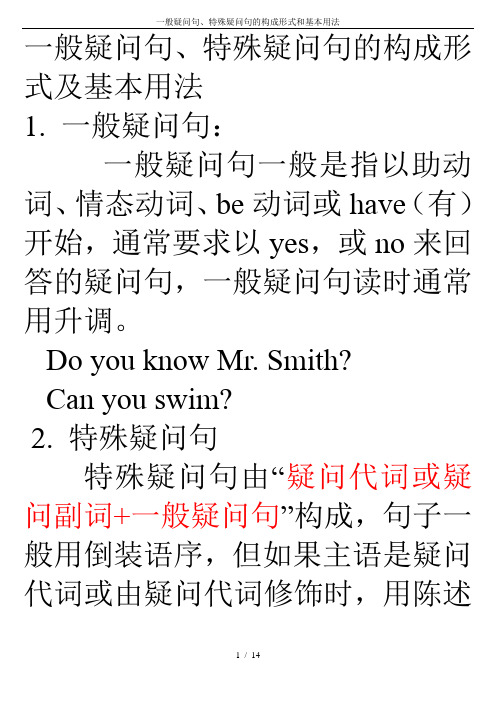
一般疑问句、特殊疑问句的构成形式及基本用法1. 一般疑问句:一般疑问句一般是指以助动词、情态动词、be动词或have(有)开始,通常要求以yes,或no来回答的疑问句,一般疑问句读时通常用升调。
Do you know Mr. Smith?Can you swim?2. 特殊疑问句特殊疑问句由“疑问代词或疑问副词+一般疑问句”构成,句子一般用倒装语序,但如果主语是疑问代词或由疑问代词修饰时,用陈述句的语序。
特殊疑问句不能用yes 或no回答,读时用降调。
例如:Who is on duty today?How long have you been in Beijing? What time do you get up every morning?What must I do now?3. 注意疑问词的选择1. 问“谁”用who或whom。
如:Who is a doctor?Li Lei is a doctor.(对主语提问用who,对宾语提问用who,whom均可)2. 问“谁的”用whose。
如:Whose book is this?This is his book.3. 问“地点”用where。
如:Where is the ball?The ball is under the bed.4. 问“原因”用why。
如:Why didn't he come?He didn't come because he was ill.5. 问“身体状况”用how。
如:How are you?I'm fine.6. 问“方式”用how。
如:How did he do it?He did it in that way.7. 问“程度”用“how +被修饰语”。
如:How wide is the river?The river is five metres wide.8. 问“多少”用how much或how many。
小学英语四种基本句型-肯定句否定句一般疑问句与特殊疑问句
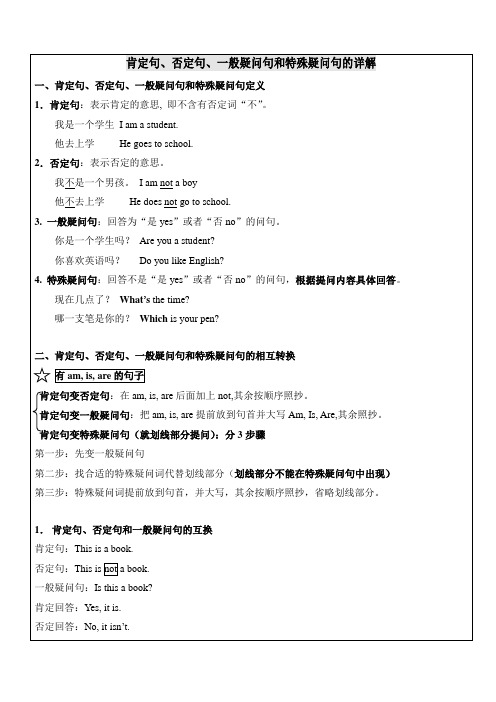
感叹句
!
特殊:
1.some 变为 any
There are some birds in the tree.→There aren't any birds in the tree. 但是,若在表示请邀请、请求的句子中,some 可以不变。 Would you like some orange juice? 与此相关的一些不定代词如 something, somebody 等也要进行相应变化。 2.and 变为 or I have a knife and a ruler.→I don't have a knife or a ruler. 3.a lot of (=lots of)变为 many 或 much They have a lot of friends.(可数名词)→They don't have many friends. There is lots of orange in the bottle.(不可数名词) →There isn't much orange in the bottle. 4.already 变为 yet I have been there already.→I haven't been there yet.
二、肯定句、否定句、一般疑问句和特殊疑问句的相互转换 有 am, is, are 的句子 肯定句变否定句:在 am, is, are 后面加上 not,其余按顺序照抄。 肯定句变一般疑问句:把 am, is, are 提前放到句首并大写 Am, Is, Are,其余照抄。 肯定句变特殊疑问句(就划线部分提问) :分 3 步骤 第一步:先变一般疑问句 第二步:找合适的特殊疑问词代替划线部分(划线部分不能在特殊疑问句中出现) 第三步:特殊疑问词提前放到句首,并大写,其余按顺序照抄,省略划线部分。
一般疑问句特殊疑问句的构成形式及基本用法

一般疑问句、特殊疑问句的构成形式及基本用法1. 一般疑问句:一般疑问句一般是指以助动词、情态动词、be动词或have(有)开始,通常要求以yes,或no来回答的疑问句,一般疑问句读时通常用升调。
Do you know Mr. Smith?Can you swim?2. 特殊疑问句特殊疑问句由“疑问代词或疑问副词+一般疑问句”构成,句子一般用倒装语序,但如果主语是疑问代词或由疑问代词修饰时,用陈述句的语序。
特殊疑问句不能用yes 或no回答,读时用降调。
例如:Who is on duty today?How long have you been in Beijing? What time do you get up every morning?What must I do now?3. 注意疑问词的选择1. 问“谁”用who或whom。
如:Who is a doctor?Li Lei is a doctor.(对主语提问用who,对宾语提问用who,whom均可)2. 问“谁的”用whose。
如:Whose book is this?This is his book.3. 问“地点”用where。
如:Where is the ball?The ball is under the bed.4. 问“原因”用why。
如:Why didn't he come?He didn't come because he was ill.5. 问“身体状况”用how。
如:How are you?I'm fine.6. 问“方式”用how。
如:How did he do it?He did it in that way.7. 问“程度”用“how +被修饰语”。
如:How wide is the river?The river is five metres wide.8. 问“多少”用how much或how many。
一般疑问句、特殊疑问句的构成形式及基本用法

一般疑问句、特殊疑问句的构成形式及基本用法1. 一般疑问句:一般疑问句一般是指以助动词、情态动词、be动词或have(有)开始,通常要求以yes,或no来回答的疑问句,一般疑问句读时通常用升调。
Do you know Mr. Smith?Can you swim?2. 特殊疑问句特殊疑问句由“疑问代词或疑问副词+一般疑问句”构成,句子一般用倒装语序,但如果主语是疑问代词或由疑问代词修饰时,用陈述句的语序。
特殊疑问句不能用yes或no回答,读时用降调。
例如:Who is on duty today?How long have you been in Beijing? What time do you get up every morning?What must I do now?3. 注意疑问词的选择1. 问“谁”用who或whom。
如:Who is a doctor?Li Lei is a doctor.(对主语提问用who,对宾语提问用who,whom均可)2. 问“谁的”用whose。
如:Whose book is this?This is his book.3. 问“地点”用where。
如:Where is the ball?The ball is under the bed.4. 问“原因”用why。
如:Why didn't he come?He didn't come because he was ill.5. 问“身体状况”用how。
如:How are you?I'm fine.6. 问“方式”用how。
如:How did he do it?He did it in that way.7. 问“程度”用“how +被修饰语”。
如:How wide is the river?The river is five metres wide.8. 问“多少”用how much或how many。
- 1、下载文档前请自行甄别文档内容的完整性,平台不提供额外的编辑、内容补充、找答案等附加服务。
- 2、"仅部分预览"的文档,不可在线预览部分如存在完整性等问题,可反馈申请退款(可完整预览的文档不适用该条件!)。
- 3、如文档侵犯您的权益,请联系客服反馈,我们会尽快为您处理(人工客服工作时间:9:00-18:30)。
基本句型:一般疑问句和特殊疑问句
一般疑问句(yes-no question):用yes和no回答的问句特殊疑问句:不用yes和no回答的问句
疑问词例句例句回答疑问词例句
Yes, you can. where Where is my sharpener?
Can Can I wear my shirt?
No, you can’t Who Who is your math teacher?
Yes, I do. How old How old is he?
Do Do you like hot dog?
No, I don’t. How many How many books do you have?
Yes, please. How much How much is the book?
Would Would you like some milk?
No, thank you. What day What day is it today?
Yes, I am. What colour What colour is your pencil-case? Is/am/are Are you a teacher?
No, I am not. What What do you have on Mondays?
常见特殊疑问句及其回答
问句答句
Where is my seat? It’s near the window.
Where are you from? I’m from China.
Who is your math teacher? Mr Chen./ My math teacher is Mr chen.
How old is he? He is ten./ He is ten years old.
How are you? I am fine.
How many people are there in your family? Six./ There are six.
How much are there apples? Five yuan./ They are five yuan.
What day is it today? It’s Monday.
What colour is your English book? It’s blue.
What do you have on Mondays? We have Chinese, English and art class. What do you have for dinner on Mondays? We have tofu and fish for dinner on Mondays. What’s your mother like? She’s tall and thin.
What’s your favourite food? My favourite food is fish./ I like fish. What’s the weather like today? It’s windy.
What would you like for dinner? I’d like some fish and eggplant.
What can you do? I can empty the trash and do the dishes.。
